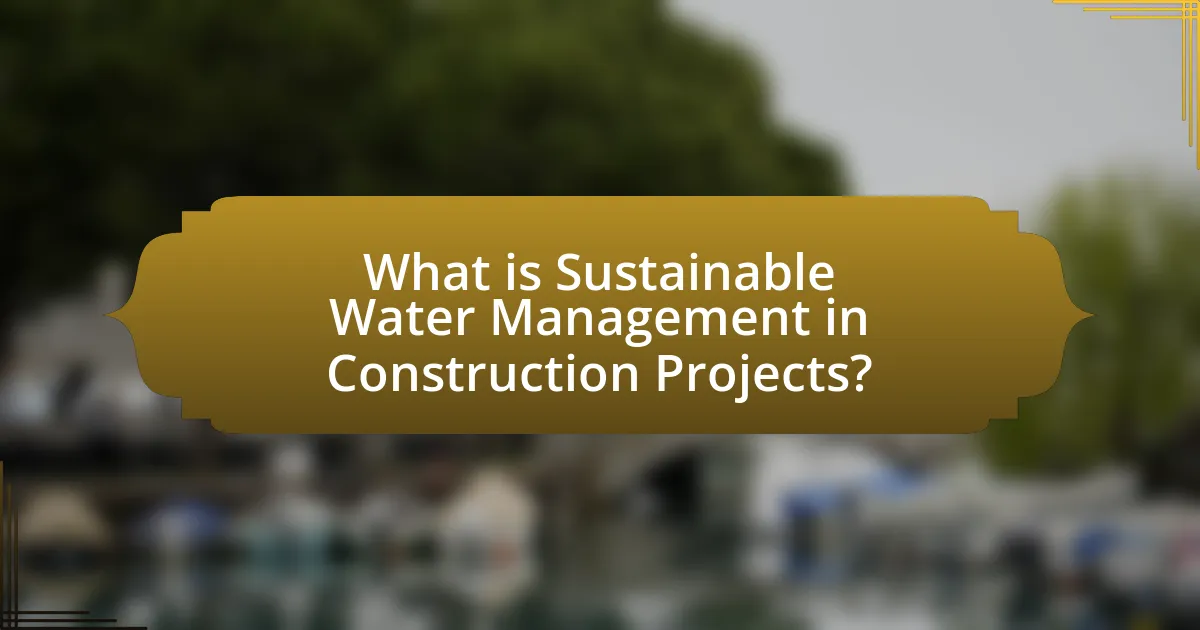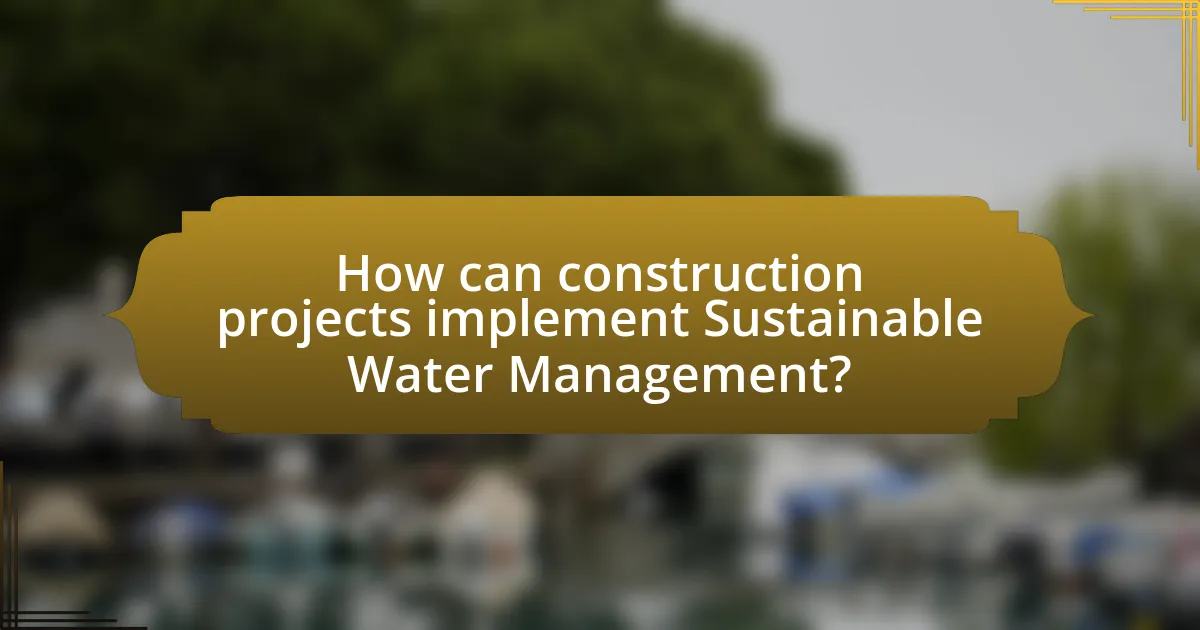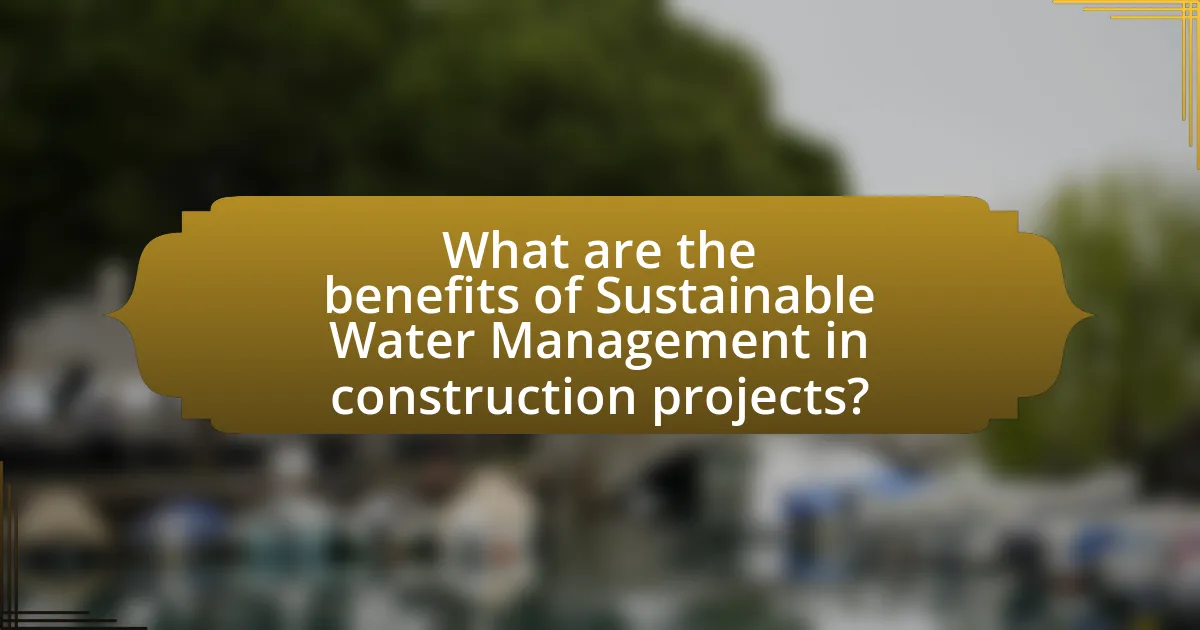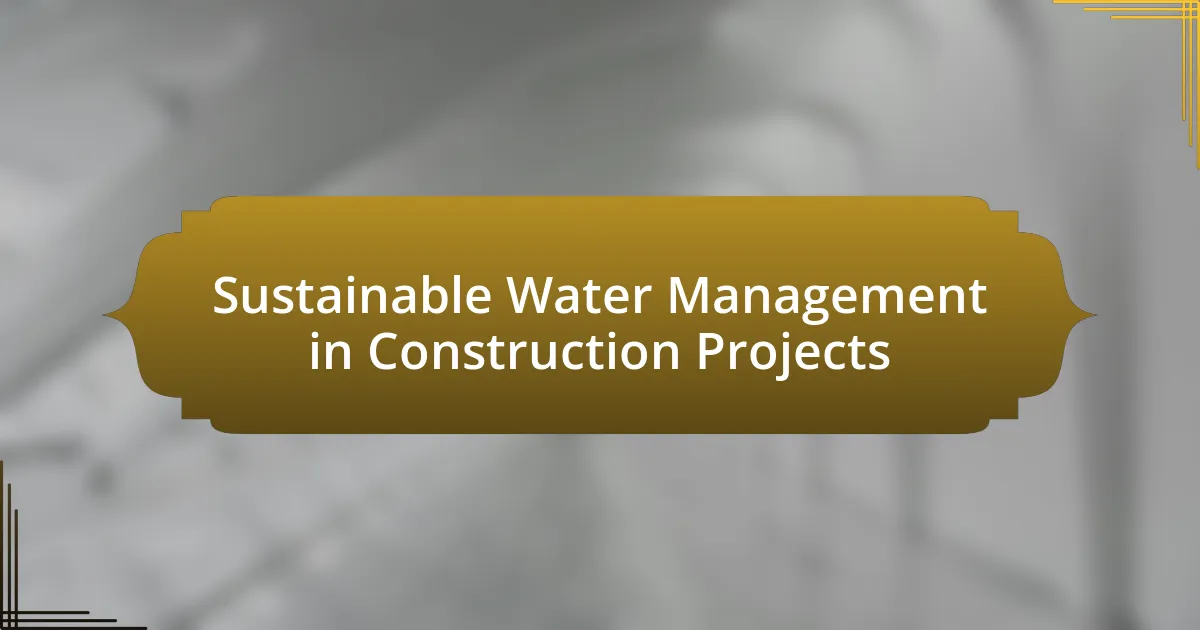Sustainable water management in construction projects involves the efficient and responsible use of water resources to minimize waste and environmental impact. Key practices include rainwater harvesting, water recycling, and the implementation of water-efficient systems, which can lead to significant reductions in water usage and costs. The article explores the importance of sustainable water management, its environmental impacts, and the benefits it offers, such as improved project efficiency and community relations. Additionally, it outlines the principles, technologies, and strategies for effective water management, while addressing challenges and misconceptions associated with its implementation.

What is Sustainable Water Management in Construction Projects?
Sustainable water management in construction projects refers to the strategic approach of using water resources efficiently and responsibly throughout the construction process. This includes practices such as rainwater harvesting, water recycling, and minimizing water waste to reduce the environmental impact of construction activities. For instance, the U.S. Green Building Council’s LEED certification encourages the implementation of water-efficient fixtures and systems, which can lead to a reduction in water usage by up to 30%. By integrating sustainable water management practices, construction projects can contribute to the conservation of local water resources and promote environmental sustainability.
Why is Sustainable Water Management important in construction?
Sustainable water management is important in construction because it minimizes water waste and promotes efficient use of water resources. Effective water management practices can significantly reduce the environmental impact of construction activities, as construction sites often consume large amounts of water for various processes, including mixing concrete and dust control. According to the U.S. Environmental Protection Agency, construction and land development can account for up to 30% of total water use in urban areas, highlighting the need for sustainable practices to conserve water and protect local ecosystems. Implementing strategies such as rainwater harvesting, water recycling, and the use of drought-resistant landscaping can lead to substantial savings in water usage and costs, while also ensuring compliance with regulations aimed at protecting water quality and availability.
What are the environmental impacts of poor water management in construction?
Poor water management in construction leads to significant environmental impacts, including soil erosion, water pollution, and habitat destruction. Soil erosion occurs when excessive runoff from construction sites washes away topsoil, degrading land quality and increasing sedimentation in nearby water bodies. Water pollution arises from the discharge of contaminants, such as oils, chemicals, and sediments, into local waterways, which can harm aquatic ecosystems and reduce water quality. Additionally, poor management practices can disrupt local habitats, affecting wildlife and plant species. According to the U.S. Environmental Protection Agency, construction activities are a leading source of sediment pollution in rivers and streams, highlighting the critical need for effective water management strategies in construction projects.
How does sustainable water management contribute to project efficiency?
Sustainable water management enhances project efficiency by optimizing resource use and reducing costs associated with water supply and waste. Efficient water management practices, such as rainwater harvesting and recycling, can decrease dependency on external water sources, leading to lower operational expenses. For instance, a study by the World Resources Institute found that implementing sustainable water practices can reduce water-related costs by up to 30%. Additionally, effective water management minimizes project delays caused by water shortages or regulatory compliance issues, thereby streamlining operations and improving overall project timelines.
What are the key principles of Sustainable Water Management?
The key principles of Sustainable Water Management include integrated water resource management, conservation of water resources, pollution prevention, and stakeholder engagement. Integrated water resource management emphasizes the coordinated development and management of water, land, and related resources to maximize economic and social welfare without compromising the sustainability of ecosystems. Conservation of water resources focuses on reducing water consumption and promoting efficient use through technologies and practices. Pollution prevention aims to protect water quality by minimizing contaminants entering water bodies, thereby safeguarding human health and the environment. Stakeholder engagement involves involving communities and relevant parties in decision-making processes to ensure that water management strategies are equitable and effective. These principles are essential for achieving sustainability in water management, particularly in construction projects where water use and impact can be significant.
How do conservation practices play a role in sustainable water management?
Conservation practices are essential for sustainable water management as they help to reduce water consumption and enhance the efficiency of water use. By implementing techniques such as rainwater harvesting, xeriscaping, and the use of low-flow fixtures, construction projects can significantly decrease their water footprint. For instance, rainwater harvesting can capture and utilize stormwater, reducing reliance on municipal water supplies and mitigating runoff. According to the U.S. Environmental Protection Agency, implementing water-efficient practices can lead to water savings of 20-50% in residential and commercial buildings. This not only conserves a vital resource but also lowers operational costs and supports ecosystem health by maintaining natural water cycles.
What technologies are utilized in sustainable water management?
Technologies utilized in sustainable water management include advanced irrigation systems, rainwater harvesting, wastewater treatment and recycling, and smart water management systems. Advanced irrigation systems, such as drip irrigation, optimize water use in agriculture by delivering water directly to plant roots, reducing waste. Rainwater harvesting captures and stores rainwater for reuse, decreasing reliance on traditional water sources. Wastewater treatment and recycling technologies, like membrane bioreactors, purify wastewater for safe reuse in irrigation or industrial processes. Smart water management systems leverage IoT and data analytics to monitor and manage water resources efficiently, leading to reduced consumption and improved sustainability. These technologies collectively contribute to more efficient water use and conservation in construction projects.

How can construction projects implement Sustainable Water Management?
Construction projects can implement Sustainable Water Management by adopting strategies such as rainwater harvesting, water recycling, and the use of permeable materials. Rainwater harvesting systems can capture and store rainwater for non-potable uses, reducing reliance on municipal water supplies. Water recycling systems treat and reuse wastewater generated on-site, significantly lowering overall water consumption. Additionally, utilizing permeable materials in pavements and landscaping allows for natural water infiltration, reducing runoff and promoting groundwater recharge. These methods not only conserve water but also enhance the resilience of construction projects against water scarcity, aligning with sustainable development goals.
What strategies can be employed for effective water management?
Effective water management strategies include implementing rainwater harvesting systems, utilizing greywater recycling, and adopting efficient irrigation techniques. Rainwater harvesting captures and stores rainwater for reuse, reducing reliance on municipal water supplies. Greywater recycling involves treating and reusing wastewater from sinks and showers for irrigation or toilet flushing, which can save significant amounts of potable water. Efficient irrigation techniques, such as drip irrigation, minimize water waste by delivering water directly to plant roots, enhancing water use efficiency. According to the U.S. Environmental Protection Agency, these strategies can lead to water savings of up to 50% in residential settings, demonstrating their effectiveness in sustainable water management.
How can rainwater harvesting be integrated into construction projects?
Rainwater harvesting can be integrated into construction projects by designing systems that collect, store, and utilize rainwater for various applications. This integration involves installing collection surfaces, such as roofs, connected to gutters and downspouts that direct water into storage tanks. According to the U.S. Environmental Protection Agency, implementing rainwater harvesting can reduce potable water use by up to 50% in buildings, demonstrating its effectiveness in sustainable water management. Additionally, local building codes and regulations often support the inclusion of rainwater harvesting systems, further facilitating their adoption in construction projects.
What role does greywater recycling play in sustainable practices?
Greywater recycling plays a crucial role in sustainable practices by reducing freshwater consumption and minimizing wastewater generation. This process involves the treatment and reuse of water from sources such as sinks, showers, and washing machines, which can significantly decrease the demand for potable water in various applications, including irrigation and toilet flushing. According to the U.S. Environmental Protection Agency, implementing greywater recycling systems can save up to 50% of residential water use, thereby promoting water conservation and enhancing sustainability in construction projects.
What are the challenges faced in implementing sustainable water management?
The challenges faced in implementing sustainable water management include regulatory complexities, financial constraints, and technological limitations. Regulatory complexities arise from varying local, state, and federal regulations that can hinder the adoption of sustainable practices. Financial constraints often limit investment in advanced water management technologies and infrastructure, as construction projects may prioritize immediate costs over long-term sustainability. Technological limitations can impede the effective collection, treatment, and reuse of water, as many existing systems are outdated or not designed for sustainable practices. According to the United Nations, approximately 2 billion people live in countries experiencing high water stress, highlighting the urgent need for effective water management strategies.
How can regulatory compliance impact water management strategies?
Regulatory compliance significantly impacts water management strategies by enforcing standards that ensure sustainable practices in water usage and conservation. Compliance with regulations, such as the Clean Water Act in the United States, mandates that construction projects implement measures to prevent water pollution and manage stormwater effectively. This legal framework compels project managers to adopt best practices, such as using permeable materials and creating retention basins, which can lead to improved water quality and reduced runoff. Furthermore, adherence to these regulations often influences project timelines and budgets, as non-compliance can result in fines and project delays, thereby incentivizing the integration of sustainable water management strategies from the outset.
What are common misconceptions about sustainable water management?
Common misconceptions about sustainable water management include the belief that it solely focuses on water conservation, neglecting the importance of water quality and ecosystem health. Many assume that implementing sustainable practices is too costly, while studies show that long-term savings often outweigh initial investments. Additionally, some think that sustainable water management is only relevant in urban areas, but rural regions also face significant water challenges that require sustainable solutions. Lastly, there is a misconception that technology alone can solve water issues, whereas effective management also relies on community engagement and policy frameworks.

What are the benefits of Sustainable Water Management in construction projects?
Sustainable water management in construction projects offers multiple benefits, including reduced water consumption, improved water quality, and enhanced project resilience. By implementing strategies such as rainwater harvesting and greywater recycling, construction projects can significantly decrease their reliance on potable water sources, leading to lower operational costs and reduced environmental impact. For instance, the U.S. Green Building Council reports that buildings designed with sustainable water management practices can reduce water usage by up to 50%. Additionally, these practices help mitigate stormwater runoff, which can lead to improved water quality in nearby ecosystems. Furthermore, sustainable water management contributes to the overall resilience of construction projects by ensuring a reliable water supply during drought conditions, thereby enhancing the long-term viability of the infrastructure.
How does sustainable water management affect project costs?
Sustainable water management reduces project costs by minimizing water-related expenses and enhancing resource efficiency. Implementing practices such as rainwater harvesting and water recycling can lower the demand for potable water, thus decreasing utility bills. For instance, a study by the Water Research Foundation found that projects utilizing sustainable water management techniques can save up to 30% on water costs compared to traditional methods. Additionally, these practices can lead to lower operational costs over time due to reduced water consumption and potential fines for water overuse, further contributing to overall project savings.
What long-term savings can be realized through sustainable practices?
Sustainable practices in construction projects can lead to significant long-term savings, primarily through reduced operational costs and enhanced resource efficiency. For instance, implementing rainwater harvesting systems can decrease water utility expenses by up to 50%, as reported by the U.S. Environmental Protection Agency. Additionally, using water-efficient fixtures and irrigation systems can lower water consumption, resulting in further cost reductions. Furthermore, sustainable practices often lead to increased property values; buildings designed with sustainable features can command higher market prices, as evidenced by a study from the University of California, which found that green buildings sold for an average of 9% more than conventional buildings. These savings not only benefit project owners but also contribute to overall environmental sustainability.
How does sustainable water management enhance community relations?
Sustainable water management enhances community relations by fostering trust and collaboration between construction projects and local residents. When construction projects implement sustainable practices, such as rainwater harvesting and efficient water use, they demonstrate a commitment to environmental stewardship, which can lead to increased community support. For instance, a study by the Water Research Foundation found that projects utilizing sustainable water management practices reported a 30% increase in community engagement and positive feedback. This engagement often results in stronger partnerships, as communities feel their needs and concerns are being addressed, ultimately leading to smoother project execution and enhanced social license to operate.
What are the measurable outcomes of effective water management?
Effective water management leads to measurable outcomes such as reduced water consumption, improved water quality, and enhanced ecosystem health. For instance, implementing rainwater harvesting systems can decrease potable water use by up to 50%, as evidenced by studies conducted in urban areas where such systems were integrated. Additionally, effective water management practices can result in a 30% reduction in stormwater runoff, thereby minimizing flooding and erosion, which is supported by data from the Environmental Protection Agency. Furthermore, maintaining water quality through proper management can lead to a 40% decrease in pollutants entering local waterways, as shown in various case studies on sustainable construction practices. These outcomes demonstrate the tangible benefits of effective water management in construction projects.
How can project success be evaluated through water management metrics?
Project success can be evaluated through water management metrics by assessing key performance indicators such as water usage efficiency, compliance with regulatory standards, and the effectiveness of water conservation measures. These metrics provide quantifiable data that reflect how well a project manages water resources, which is critical in sustainable construction practices. For instance, a study by the World Resources Institute indicates that projects achieving a 20% reduction in water usage compared to baseline levels are considered successful in their water management efforts. Additionally, tracking metrics like the percentage of recycled water used can further demonstrate a project’s commitment to sustainability and resource efficiency.
What case studies illustrate successful sustainable water management?
Case studies illustrating successful sustainable water management include the Singapore Marina Barrage, which integrates flood control, water supply, and recreational space, demonstrating effective urban water management. Additionally, the city of Cape Town implemented a water conservation strategy during its severe drought, which included rainwater harvesting and wastewater recycling, resulting in a significant reduction in water consumption by 30%. These examples highlight innovative approaches to managing water resources sustainably in urban environments.
What best practices should be followed for Sustainable Water Management?
Best practices for sustainable water management include implementing rainwater harvesting systems, utilizing greywater recycling, and adopting efficient irrigation techniques. Rainwater harvesting captures and stores rainwater for non-potable uses, reducing reliance on municipal water sources. Greywater recycling involves treating and reusing wastewater from sinks and showers, which can significantly decrease overall water consumption. Efficient irrigation techniques, such as drip irrigation, minimize water waste by delivering water directly to plant roots. These practices not only conserve water but also enhance the resilience of construction projects against water scarcity, as evidenced by studies showing that rainwater harvesting can reduce water costs by up to 50% in urban areas.
How can construction teams ensure compliance with sustainable practices?
Construction teams can ensure compliance with sustainable practices by implementing comprehensive sustainability plans that include water conservation strategies, waste reduction techniques, and the use of eco-friendly materials. These plans should be aligned with local regulations and industry standards, such as LEED certification, which provides a framework for sustainable building practices. For instance, according to the U.S. Green Building Council, projects that achieve LEED certification demonstrate a commitment to sustainability through measurable outcomes in energy efficiency, water usage, and material sourcing. By regularly training team members on sustainable practices and conducting audits to assess compliance, construction teams can effectively monitor and improve their adherence to these practices.
What resources are available for improving water management strategies?
Resources available for improving water management strategies include advanced technologies, best practice guidelines, and educational programs. Technologies such as smart irrigation systems and water recycling systems enhance efficiency and reduce waste. Best practice guidelines, like those from the International Water Association, provide frameworks for sustainable practices in various sectors. Educational programs, including workshops and online courses from organizations like the Water Environment Federation, equip professionals with the knowledge to implement effective water management strategies. These resources collectively contribute to more sustainable water management in construction projects.

Leave a Reply